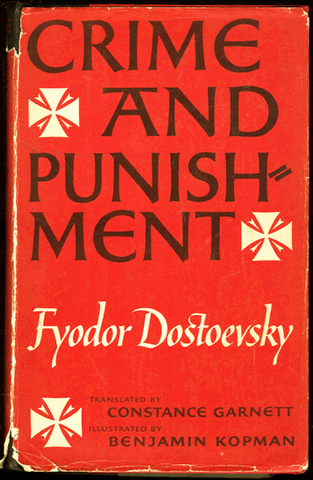I read
Fyodor Dostoevsky’s Crime and Punishment in high school. Okay, it was an
abridged version, and I can barely recall anything about it today, but what I
do remember is the basic premise of the novel: how the protagonist (?)
Raskolnikov commits a heinous act and pays for it not immediately through the
justice of man, but through mental anguish and being tormented by his own
conscience and guilt. It was one of those novels that I must admit was probably
too much for a 13-year-old to fully comprehend.
Image from Wikipedia
Through
Jessica Zafra, all-around savant and hellraiser, I learned about Norte: Hangganan ng Kasaysayan, the
latest film of Lav Diaz. I like watching movies, but no, I am not a film
snob and certainly don’t claim to be any sort of expert or one of those
hardcore cinephiles (I’ve been known to be quite handy with movie trivia during
Quiz Nights, though). I have never seen a Lav Diaz film before, but I am well
aware of their, er, distinguishing characteristic, or filmmaker trademark, if
you will: they’re long. As in don’t-wait-up, squirm-in-your-seat, risk-of-callouses-on-the-ass
long. But the fact that Jessica has championed the film for months (she’s a
producer on it, too) was enough reason for me to check it out. I found out a
bit later that it’s apparently a loose adaptation of Crime and Punishment, and that
only made the movie more appealing. Reimagining 19th century Russia into modern-era
Philippines? Intriguing.
I was
happy when it got a commercial run. Previous screenings of Norte were one-off;
tickets were almost always sold out. Jessica also mentioned that it was the
most accessible for general audiences out of all of the director’s oeuvre. I
finally caught it Sunday night with my perennial movie buddy Madel. It was
about four hours long, which wasn’t bad considering that other films of Lav
Diaz were much, much longer.
Image from Jessica Zafra's blog (jessicarulestheuniverse.com)
The
best films, I think, are those that challenge you to see the world in a new
way, or at least, make you feel something in your heart long after you leave
the theater. Norte did that by making me question my beliefs on justice and
morality. (And making Madel cry. Hard. Sorry Madel!) All the glowing reviews it
has gotten--everyone from foreign film critics to local captains of
industry, to my own colleagues and Facebook friends--are well-deserved. It’s
long, yes, but, save for an extra bathroom break (I usually only need one, or
none at all), I don’t think I even glanced at my watch. Having read the book
upon which the film is based, I knew what was coming the moment the character Magda
was introduced. Beyond that, I had no idea what to expect, and what I saw was disturbing, depressing and eye-opening.
Initially
I found the philosophical discourses a tad pretentious, but quickly realized
that people like that do exist; those who engage in “smart” talk about concepts
and ideas instead of events or personalities. The actors were all phenomenal,
but Sid Lucero is something else. His Fabian is both damaged and arrogant;
self-centered but empathetic. I thought of him as a part-time sociopath whose perceived
intellect makes him justify his actions, whatever they are. That’s actually
one of my main takeaways from this movie: a brilliant mind that isn’t
challenged will likely descend into madness or despair. Or worse.
Could
the film have benefited from more economical editing? That is not a question
for me to answer. (I’m sure the filmmaker is so exasperated he’ll probably
shoot point blank the next person who asks him why his films are so long). For
me though, the end came so suddenly that I had to stifle nervous laughter. That
was it?! Why did [blank] have to die? What’s going to happen to [blank]’s case?
And [blank] stares off into the horizon from a boat? Is that the end of
history? There are more questions than answers. But my first experience with a
Lav Diaz film was certainly that: an experience. Norte is like a splinter that has lodged itself near my heart so deeply
that I found it difficult to move or even breathe. And those are always the
best kinds of movies.

